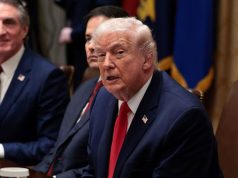Kenyan president William Ruto has withdrawn a bill which sparked deadly protests in Nairobi, saying he was respecting Kenyans’ “loud” opposition to it.
After 22 people were reportedly killed in violent protests on Tuesday which also saw part of Kenya’s parliament building burnt, Mr Ruto said he would no longer be introducing unpopular new financial laws which would have hiked taxes for Kenyans.
Protesters said the bill would have put yet more pressure on ordinary citizens and businesses trying to grapple with the high cost of living.
The government claimed it wanted to raise funds to pay off debt.
Read more:
Kenya protesters shot dead as tax bill passes
Police teargas protesters in Nairobi amid anti-tax demonstration
“Listening keenly to the people of Kenya who have said loudly that they want nothing to do with this finance bill 2024,
I concede.
“And therefore, I will not sign the 2024 finance bill, and it shall subsequently be withdrawn,” Mr Ruto said in a televised address.
Thousands of people stormed parliament on Tuesday, making it the biggest assault on Kenya’s government in decades.
The chaos led Kenya’s government to deploy the military as Mr Ruto called protesters’ actions “treasonous”.
At least 22 people were killed, the Kenya National Human Rights Commission said. Commission chairperson Roseline Odede added 50 people were arrested.
Mr Ruto acknowledged the deaths during his address on Wednesday, calling it an “unfortunate situation”, and offered condolences.
Mr Ruto said many of the 214 people “involved in various skirmishes” during the protests were taken to hospital, 95 of whom were treated and released.
Soldiers patrolled alongside police, who were accused of shooting several people dead.
Authorities said police fired over 700 blanks to disperse protesters in the Nairobi suburb of Githurai overnight.
Videos of the gunfire were shared online.
Opposition leader Raila Odinga condemned the killing of protesters and the “brute force” of authorities and called for dialogue, asserting that Kenya’s constitution had been suspended.
“Kenya cannot afford to kill its children just because the children are asking for food, jobs and a listening ear,” Mr Odinga said in a statement.
In Nairobi, a regional hub for expatriates and home to a United Nations complex, inequality among Kenyans has sharpened along with long-held frustrations over state corruption.
A booming young population is also frustrated by the lavish lifestyles of politicians, including the president.
Some who had passionately supported Mr Ruto, who won the presidency by portraying himself as a “hustler” from a humble background, feel betrayed.




















